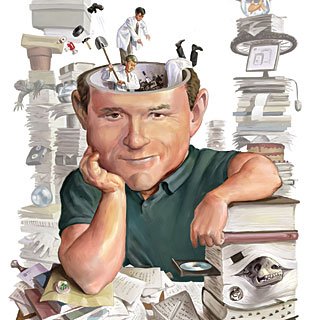The Best Way to Learn Anything
I can memorize anything you put in front of me. Straight "A"s were always easy to come by for me in school: history, math, English, science, whatever. Memorize the rules, the facts, the story and spit it back out on a test.
Years later, I wonder why I spent so much of my childhood memorizing things that now I have no idea about. That’s the problem with short term memory – here today, gone tomorrow. But that’s how our schools are set up for students to be successful – if you can memorize, you are golden. If you rely on logic and inquiry, good luck!
The Solution: The Best Way to Learn Anything
I recently went to a conference in Atlanta, GA where I was presented with a different approach to teaching and learning. Understanding by Design (UBD) tackles it from a backwards design approach, starting with the end in mind.
When using this framework, you focus on three areas of teaching and learning:
- Transfer (what you will still have with you in 40 years – these are the coat hangers I get to later). This is the big idea or the backbone of what you are talking about.
- Meaning (this is what will stay with you for 40 months). It includes enduring understandings and essential questions.
- Acquisition (you will lose most of this in 40 days). This is the knowledge and skills you need to be able to complete specific tasks (and most of what schools focus on).
If you haven’t heard of this framework, I would recommend checking out a book on the subject, such as “the Understanding by Design Guide to Creating High Quality Units” by Grant Wiggins and Jay McTighe.
Fundamentally, the approach just seems like good common sense, but so often it is easy to overlook the obvious and take the “easy” way out. The framework deals with various steps to creating good content. Some of the highlights include: being okay with a messy process, focusing on the big picture or goal, using essential questions to the extreme, and getting away from viewing teaching and learning with that cookbook or textbook approach.
The Coat Hanger Effect
The biggest take away I had from this conference is the coat hanger effect approach to teaching and learning. I truly think this is the best (and the UBD research backs that up) approach you can take to learn anything.
When you approach a new field or subject, think about setting up coat hangers in your brain. What are the all-important biggest concepts or ideas surrounding this subject? There should not be a lot of coat hangers. Then, as you go through the course or learning activities, make sure to file every piece of information under one of those coat hangers. Instead of having a string of miscellaneous facts and stories, you will have a few “coat hangers” to help provide a stable base and long term memory station for what you are learning.
A great example of this is the Steemit post I read recently by @anarchyhasnogods about power in science: https://steemit.com/science/@anarchyhasnogods/power-and-electricity-basic-physics-part-five
He talked about all sorts of particulars, but continued to bring it back to the “coat hanger” of power. And there is so much more you can learn about power. When you come across those things, continue to file them under that coat hanger in your brain for easy access to them in the future.
Just remember: find that big thing that everything else can relate to and hang it off of it. Happy Learning!




You can always force choke someone until they learn.

lol nice. I've tried that with my husband and learning how to do the laundry but I think I'm just not strong enough.
There is a window where these two can overlap. My way to memorize things was to ...understand them. If I understood something, then no matter the subject field, I was ok. And actually the understanding meant that things were now stored in the long term memory for life.
Cool, that is actually exactly what the coat hanger effect is getting at.
Great Post.
I used to have a photographic memory too but it disappeared after puberty. I wonder if it has something to do with frontal lobe changes.
I also suppose that as your brain fills up with information there is less room for new information and you do flood your brain with huge amounts of new information in early adulthood.
This coat hanger method is interesting. I will see if I can get this book and will give it a read.
That's interesting - it is so strange how the ability to memorize can change from your early adulthood. I think we need a psychologist on the scene here to comment. That coat hanger effect was something the amazing presenters at the conference used to explain the overarching basis of the book. There is a lot of free info online about the Understanding by Design framework too, so you may want to start there.
Thanks I will take a look. I think in psychology there are a number of theories to account of it. On the one hand there is the idea that as you have more experiences you develop the ability to be more selective about what information you store. This would be enhanced executive function as a result of increased frontal lobe activity which is one of the major changes that occurs in adolescence and throughout early adulthood.
There is also the issue of memories being formed and consolidated more often and more strongly for novel experiences. The older you get the fewer truly novel experiences you have and the more similarities there are in your day to day experiences.
Thanks for explaining that - and I guess this selective process of what to store is something we don't have control over - I wish we did! I would have told mine to keep selecting a variety of things. Although memorizing things still comes fairly quickly, I would love to be able to do it the way I used to.
Me too. I think it is a natural adaptation to the limits of storage. The brain must prioritise what to store and things that are novel probably have a survival benefit.
Survival benefit makes sense - that is actually stuff that still comes easiest for me, like learning new skills for work and such.
Wow thanks man. Great article as well. I actually get bad grades in school because memorizing stuff is way too boring for me lol
haha that's probably why you had such a good example of doing it the coat hanger way. :) Thanks.
I think that practice and exercises are also important, especially in science. Learning some concepts is good, of course, but being able to apply them to specific problems is better.
Yes, for sure. This isn't taking away from that aspect of it - that is the acquisition part of the framework. Instead it is trying to convey the importance of organizing the information in your brain and gaining deeper meaning from it so you keep it for the long term. Trust me, with high schoolers not being able to multiply 7x3 without a calculator I am ALL for practice, exercise, and memorization starting from a young age!
me too! :)
Very interesting. Schools want automatons not thinking beings.
Very interesting. I've been thinking about this recently, though it hadn't come to a point where I could articulate it. Once you understand the principles of something, it's hard to forget them. The details might fade, but the foundations are normally still there years later. I guess it poses a challenge, because you have to think conceptually and identify what the basic ideas are.